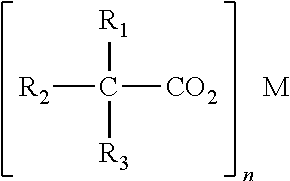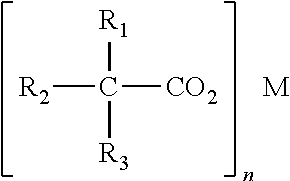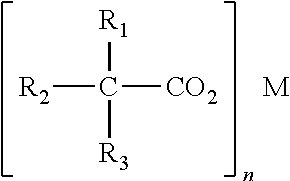Catalyst compositions and methods for making foam
a catalyst and composition technology, applied in the field of catalyst compositions, can solve the problems of increasing the production rate of foamed products, and achieve the effects of reducing foam cell size, increasing production rates, and fast cure profiles
- Summary
- Abstract
- Description
- Claims
- Application Information
AI Technical Summary
Benefits of technology
Problems solved by technology
Method used
Image
Examples
example 1
n of the Control Catalyst in a PIR Formulation
[0073]The evaluation of the catalyst reactivity in a PIR system was conducted using free-rise cup foam samples with a FOMAT sonar Rate-Of-Rise device (hereafter referred to as a “ROR”). The FOMAT device comprises a sonar sensor that measures and records the height in millimeters (mm) of the rising foam sample versus time in seconds (s), directly after mixing all components of the formulation. The FOMAT standard software generates both height versus time plots and velocity versus time plots. These plots are useful for comparing the relative reactivity of different catalyst formulations. One suitable formulation for making PIR foam samples for ROR measurement by the FOMAT, including the relative amount of different components, is described below in Table 2.
[0074]
TABLE 2COMPONENTCONTROL(mass percent in resin)(Example 1)Polyester Polyol70-75Tri-chloro-propylphosphate 7-10Dabco ® DC55851.5-2.0Water 0.0-0.50n-Pentane15-20Polycat ® 360.15-0.30D...
example 2
n of the Inventive Catalyst Combination of a Bismuth Carboxylate and a Potassium Carboxylate
[0080]A foam was prepared according to the procedure described in Example 1 such that the total resin blend contained 0.25% by weight Catalyst D, 2.25% by weight Dabco® K15, and 0.5% by weight Polycat® 46. The ratio of moles bismuth to moles potassium utilized in this example is 1 mole bismuth to about 40 moles potassium. The cell sizes and R-value were measured from molded parts in accordance with Example 1 and are given in Table 3.
[0081]The foam produced from the Control formulation reaches a height of 50 mm approximately 12 seconds after mixing, and reaches a height of 300 mm approximately 24 seconds after mixing. In contrast, the foam produced from Example 2 with the inventive catalyst combination reaches a height of 50 mm approximately 7 seconds after mixing and a height of 300 mm about 14 seconds after mixing. This represents a significant reduction in the time required for the foaming ...
example 3
valuation of the Inventive Catalyst Combination of a Bismuth Carboxylate and a Potassium Carboxylate
[0084]A first set of foams were prepared according to the procedure described in Example 1 such that the total resin blend contained either 2.75% wt Dabco® K15 (Example 3a), 2.75% wt Catalyst A (Example 3b), or 3.30% wt Polycat® 46 (Example 3c). A second set of foams were prepared by the same procedure, and further comprised 0.25% wt Catalyst D in the total resin blend for each (Examples 3d, 3e, 3f). The weight percent of catalysts for each foam is shown in Table 4. For all three formulations that contained Catalyst D, the molar ratio of bismuth to potassium was approximately 40 moles potassium to every 1 mole bismuth. The time after mixing for the foams to reach 50 mm and 300 mm in height, the maximum foam rise velocity, and the time after mixing it took to reach the maximum velocity, are shown in Table 4. The R-values were measured from molded parts in accordance with Example 1 and ...
PUM
| Property | Measurement | Unit |
|---|---|---|
| average cell diameter | aaaaa | aaaaa |
| cell diameter | aaaaa | aaaaa |
| average cell diameter | aaaaa | aaaaa |
Abstract
Description
Claims
Application Information
 Login to View More
Login to View More - R&D
- Intellectual Property
- Life Sciences
- Materials
- Tech Scout
- Unparalleled Data Quality
- Higher Quality Content
- 60% Fewer Hallucinations
Browse by: Latest US Patents, China's latest patents, Technical Efficacy Thesaurus, Application Domain, Technology Topic, Popular Technical Reports.
© 2025 PatSnap. All rights reserved.Legal|Privacy policy|Modern Slavery Act Transparency Statement|Sitemap|About US| Contact US: help@patsnap.com



